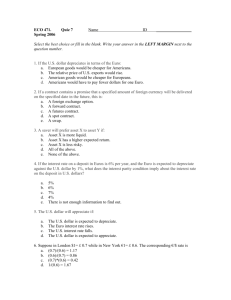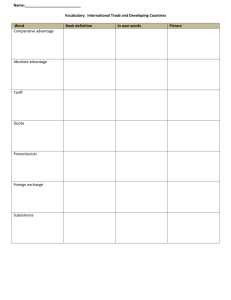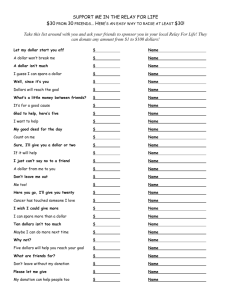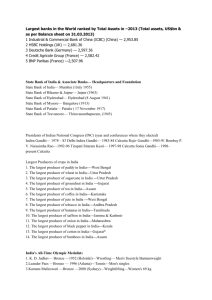Chapter 3: THE WORLD MARKETPLACE
advertisement
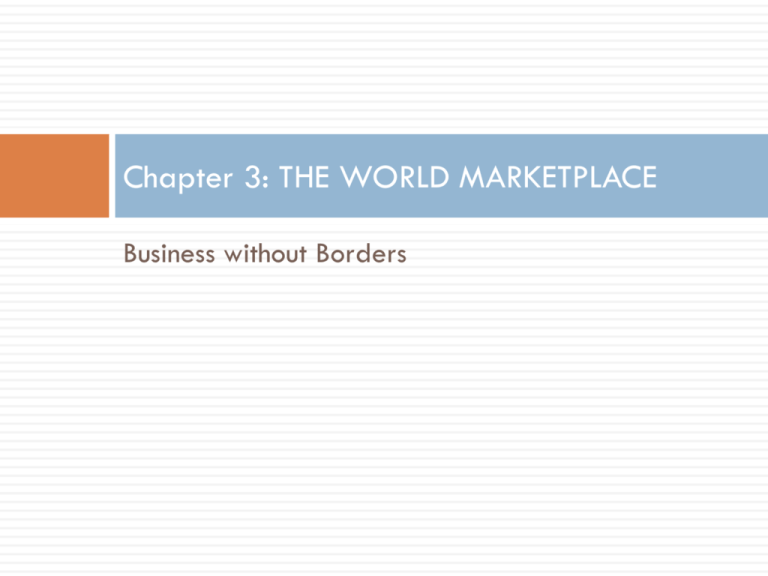
Chapter 3: THE WORLD MARKETPLACE Business without Borders AN UNPRECEDENTED OPPORTUNITY With technology and telecommunications booming, and trade barriers falling, the economic boundaries between nations have begun to blur. WORLDWIDE ECONOMIC GROWTH Nation Population Per Capita GDP (U.S. Dollars) GDP Growth Rates China 1,330,044,605 $6,100 +9.8% India 1,147,995,898 $2,900 +7.3% United States 303,824,646 $48,000 +1.4% Indonesia 237,512,355 $3,900 +5.9% Brazil 196,342,592 $10,300 +5.2% KEY REASONS FOR INTERNATIONAL TRADE Access to Factors of Production Reduced Economic Risk Innovation Competitive Advantage GLOBAL TRADE: TAKING MEASURE Balance of Trade Trade Deficit Trade Surplus Total value of imports > Total value of exports Total value of imports < Total value of exports Balance of Payments Balance of Payments Deficit Balance of Payments Surplus Exchange Rates Countertrade $$ flowing in < $$ flowing out $$ flowing in > $$ flowing out United States Balance of Trade Year Jan Feb Mar Apr May Jun Jul Aug Sep Oct Nov Dec Total 2009 -37.0 -26.6 -28.9 -29.1 -26.4 -27.5 -31.9 -30.7 2008 -61.5 -61.7 -59.4 -62.1 -60.5 -60.2 -64.9 -60.9 -60.1 -59.4 -43.2 -41.9 -695.9 2007 -58.6 -57.8 -61.6 -59.7 -59.2 -58.7 -57.9 -56.3 -57.3 -57.0 -59.5 -57.8 -701.4 2006 -67.0 -62.5 -62.2 -62.6 -64.9 -63.6 -66.8 -67.8 -64.7 -58.8 -58.4 -61.0 -760.4 -238.0 The balance of trade is the difference between the monetary value of exports and imports in an economy over a certain period of time. A positive balance of trade is known as a trade surplus and consists of exporting more than is imported; a negative balance of trade is known as a trade deficit or, informally, a trade gap. EXCHANGE RATES: WHO BENEFITS? STRONG DOLLAR VS EURO: (Example: $1.00 = 1.20 euros) • U.S. travelers to Europe Dollar buys more in Europe • American firms with European operations Operating cost are lower • European exporters European products costs less in U.S. WEAK DOLLAR VS. EURO: (Example: $1.00 = .60 euros) • European travelers to U.S. Euro buys more in America • European firms with American operations Operating costs are lower • American exporters American products cost less in Europe American Dollar Exchange Rate Country AUSTRALIA BELGIUM CANADA DENMARK EUROPEAN UNION FINLAND FRANCE GERMANY HONG KONG ISRAEL ITALY JAPAN KOREA (SOUTH) MEXICO NETHERLANDS NEW ZEALAND NORWAY RUSSIA SAUDI ARABIA SINGAPORE SOUTH AFRICA SPAIN SWEDEN SWITZERLAND TAIWAN UNITED KINGDOM Currency ISO 03/06/09 03/05/09 Change Dollar Franc Dollar Krone Euro Markka Franc Mark Dollar Sheqel Lira Yen Won Peso Guilder Dollar Krone Ruble Riyal Dollar Rand Peseta Krona Franc Dollar Pound AUD BEF CAD DKK EUR FIM FRF DEM HKD ILS ITL JPY KRW MXN NLG NZD NOK RUB SAR SGD ZAR ESP SEK CHF TWD GBP 1.561302 31.83601 1.286062 5.887687 0.789194 4.692334 5.176773 1.543529 7.755508 4.241282 1528.093 97.89695 1549.853 15.26503 1.739155 1.985100 7.064156 35.73181 3.755190 1.545703 10.42447 131.3108 9.201466 1.152777 34.67172 0.708837 1.560571 32.10681 1.287082 5.937769 0.795907 4.732248 5.220808 1.556659 7.758287 4.234666 1541.091 98.37888 1568.522 15.31762 1.753948 1.994357 7.098946 35.86129 3.755172 1.554073 10.65067 132.4278 9.291274 1.172858 34.94653 0.708185 +0.0468% -0.8434% -0.0792% -0.8434% -0.8434% -0.8434% -0.8435% -0.8435% -0.0358% +0.1562% -0.8434% -0.4899% -1.1902% -0.3433% -0.8434% -0.4642% -0.4901% -0.3611% +0.0005% -0.5386% -2.1238% -0.8435% -0.9666% -1.7121% -0.7864% +0.0921% in USD GLOBAL MARKET DEVELOPMENT OPTIONS Lower Risk Exporting Less Control Higher Risk Licensing Franchising Direct Investment More Control STRATEGIES FOR REACHING GLOBAL MARKETS Licensing McDonalds Providing the right to produce and market products under its operating requirements. Direct Investment Authority given by domestic firm for rights to produce/market its product and use trademarks/patents. Franchising Coke/Pepsi Firms acquire businesses or develop new facilities in foreign countries. Joint Ventures Two or more companies joining forces to pursue specific opportunities (Partnership or Strategic Alliances MULTINATIONAL FIRMS Do you know where the firm that ultimately owns each brand is headquartered? Nestle Quick Switzerland Nokia Cell Phones Finland Jaguar Automobiles India Michelin Tires France Shell Oil Netherlands/England Columbia Records Japan/Germany BARRIERS TO INTERNATIONAL TRADE Sociocultural Differences Economic Differences Political & Legal Differences SOCIAL/CULTURAL DIFFERENCES Think beyond the obvious differences. Social/cultural differences can rapidly undermine Nonverbal Communication business relationships. Forms of Address Attitudes toward punctuality Religious Celebrations Business Practice/Gifts ECONOMIC DIFFERENCES Exchange Rates Population Per Capita Income Infrastructure Transportation Communication Energy Finance Can you profitably provide your product or service to meet the needs of the market? POLITICAL & LEGAL DIFFERENCES Political regimes differ around the world Legal Differences Lack of Enforcement Bribery Political Climate Stability Violence Piracy and intellectual property is a problem in several foreign nations PROTECTIONISM Reasons to Create Trade Restrictions Reasons to Eliminate Trade Restrictions Protect domestic industry Reduce prices and increase choices for consumers Protect domestic jobs in key industries Increase domestic jobs Retaliate against countries who have engaged in unfair trade practices Build exporting opportunities Pressure other countries to change their policies and practices Use world resources more efficiently TRADE RESTRICTIONS Tariffs Quotas Limitations on the amount of specific products that may be imported from certain countries Voluntary Export Restrictions Taxes levied against imports Limitations on the amount of specific products that one nation will export to another Embargo Total ban on international trade of a certain item or a total halt in trade with a specific nation GLOBAL EMPLOYMENT “ A new study suggests that 2.3 million service jobs will have moved from the United States to other countries by 2008, up from 900,000 as of 2003. “ REVERSE BRAIN DRAIN Many talented immigrants are moving home to take advantage of new economic opportunities. US companies can cut costs by sourcing employees from overseas. But is America losing potential innovators such as Sergey Brin, founder of Google? FREE TRADE: THE MOVEMENT GAINS MOMENTUM There has been a global move toward free trade – the unrestricted movement of good and services across borders. GATT AND WORLD TRADE ORGANIZATION (WTO) General Agreement on Tariffs & Trade (GATT) Established in 1948 Now encompasses 125 nations Slashed tariffs by about 30% Promote International Trade Settle Trade Disputes FREE TRADE The World Bank 185 Member Countries Reduce World Poverty in Developing World Influence Global Economy Provide Financial Assistance Low interest loans The International Monetary Fund Support Stable Exchange Rates Facilitate International Payments Adopt Economic Policies Promote Trade Lend money to member nations TRADING BLOCS/COMMON MARKETS Groups of Countries promoting the free flow of goods and services The North American Free Trade Agreement (NAFTA) The largest trading bloc US, Canada, Mexico European Union (EU) The largest common market 27 nations; combined GDP $15Trillion Goal is to bolster Europe’s trade position
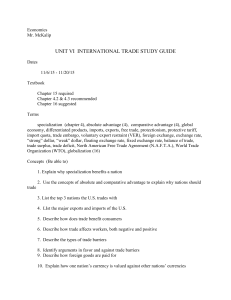
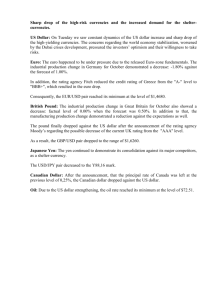
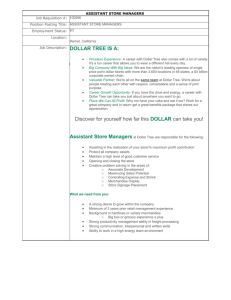
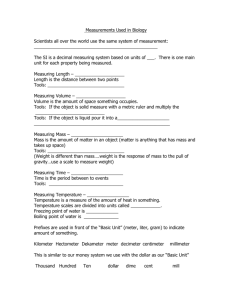
![Quiz About [Your Topic]](http://s3.studylib.net/store/data/009237721_1-467865351cf76015d6a722694bb95331-300x300.png)
